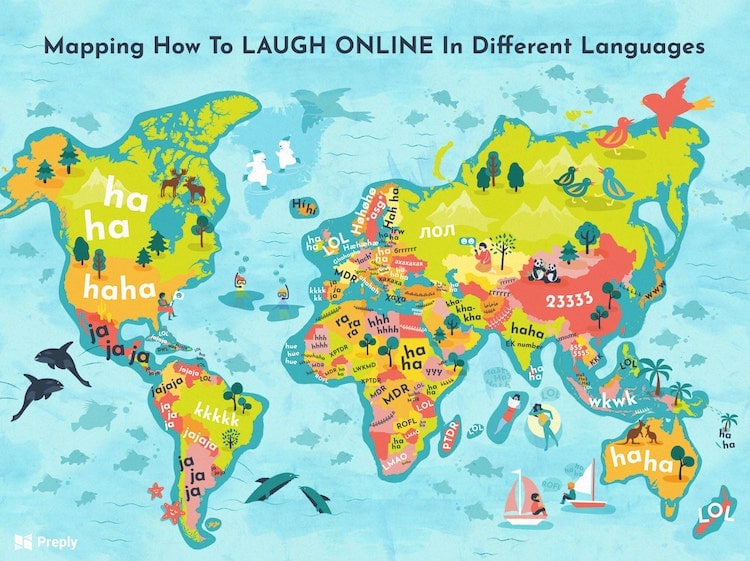
When it comes to in-person conversations, laughter is universal. You may not speak the same language, but you can understand one another through laughter. Online humor, too, has become a significant portion of our communication with people from all over the world. If you speak English, you probably tend to use onomatopoeia (“haha”), abbreviations (“LOL” or “LMAO”), or maybe you have a favorite emoji. But have you ever thought about laughing online in different languages?
Language-learning website Preply compiled a list of how to laugh online in 26 languages. It turns out that the onomatopoeia for laughter—”haha” is the most common—is spelled phonetically using different languages’ respective alphabets. However, there are also some other shorthand ways of communicating laughter, depending on where you’re from and what language you speak. For instance, in Thai, you may write “55555” instead of “Haha.” Why? It turns out that the number five is pronounced like “haa” so the series of fives is a form of onomatopoeia.
Scroll down for more ways that people laugh online in different languages.
Here’s what laughing online looks like in different languages:
Arabic
Laughter is written as “هههههههههه” in standard Arabic, which is pronounced like “hahaha”. Though the language is spoken in many nations around the world, they often have their own dialects that makes them unique to their specific country. This written form of laughter is universal within the Arabic speaking community though.
English
In English, it is common for people to write variations of “haha” (e.g. “hahaha” or “bahaha” or “haaaa”) as a response to something funny or “hehe” for a little mischievous giggle. Other forms of written laughter in online speak includes “LOL” (which stands for “laughing out loud”), “LMAO” (“laughing my ass off”), and “ROFL” (“rolling on the floor laughing”).
French
The most common is “MDR,” which means “Mort de Rire” (“dead laughing”). To laugh even harder, there’s the abbreviation “PTDR“—Pété de Rire. Péte can mean farting, but it’s generally a more familiar version of “casser,” which means “to break.” So, “PTDR” means “broken with laughter” and not necessarily “laughing so hard I farted,” but still…hilarious.
Greek
Greek online laughter has all kinds of abbreviations. “Lol” in Greek letters is “λολ,” but more typical is “χαχα,” which is “haha.” For jokes or sarcastic laughter, Greek speakers prefer “χοχο.” That last one is situational, though; “xoxoxo” also means “hugs and kisses” in Greek. There’s also the sneaky laugh “χεχε” (“cece”), and the female giggle, spelled “χιχι” (“çiçi”). An evil laugh is “μπουχαχα” (“buxaxa”). Finally, there’s the mocking “χα0χα0χα0,” which is used in trolling situations (similar to “huehuehue” which is common in Brazilian Portuguese).
Indonesian
The Indonesian spelling may have come about due to the languages’ keyboard layout. “Wkwk,” “wkwkwk,” “wakaka” and “xixi,” are popular, reportedly because it was easier for users to type “k” rather than “h,” which requires them to move their forefinger away from its place on the keyboard.
Italian
For Italian speakers, the onomatopoeia for laughter is different, resulting in the spellings “ahahah” and “eheheh,” because the language does not have the strong aspirated “ha” sound.
Jamaican Patois
As an English-based creole language with West African influences, speakers of this language use the abbreviation “DWL,” which stands for “dead wild laugh.”
Korean
In Korean, is common to write laughter as ㅋㅋㅋ (“kkk”) and ㅎㅎㅎ (“hhh”). When Koreans use the Latin alphabet in their writing, they write their laughter as “k-k-k-k-k-k.”
Polish
Polish teenagers will sometimes use the word “Heheszki,” meaning “kicking and laughing.” For the most part, though, they use more English slang like “haha.”
Spanish
Laughing is represented with “jajaja,” but you also have options. To express irony, Spanish speakers use “jejeje,” or “jijiji” for a more mischievous laughter.
Thai
In Thai, the number five is pronounced “haa,” so Thai speakers type their laughter as “55555.” To signify that they’re laughing a lot, they add a plus sign at the end (like this: “55555555+“).
Turkish
Like in several other languages, online laughter in Turkish can be written as “hahaha” or in reverse as “ahahah.” Other less universally common ways that laughter is displayed is “jsjsjsjs” and “weqeqwqewqew.” Another interesting way that Turkish speakers communicate laughter is by pressing a random string of keys on their keyboard to end up with something like this: “dksajdksajdoşad.”
Ukrainian
In Ukrainian, laughter is written as “axaxaxax,” but, like Spanish, there’s also the option for a different tone: “азаза,” written in Cyrillic characters, represents sarcastic laughter.
Vietnamese
“Hihihi,” is the most common, but there are also spellings for laughing in different emotions. There’s “khà khà khà” (like the English “hehehe”), “hê hê” (laughing proudly), “hì hì” (a weak laugh) or “hô hô.”
For the fully explained list of how to laugh online in 26 languages, visit Preply.
Preply: Website | Facebook | Instagram
h/t: [Neatorama]
Related Articles:
Comic Artist Maps the History of Languages with an Illustrated Linguistic Tree
Most Common Languages Spoken Around the World and Their Native Speakers
This World Map Shows You the Name of Every Country in Its Own Official Language
